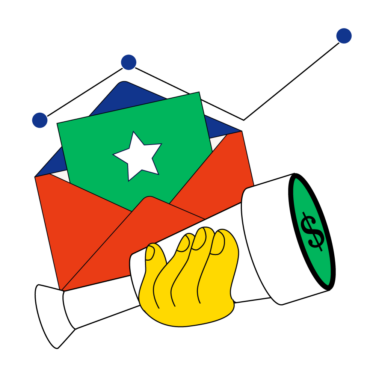A top-rated CRM system is the key to driving business growth in 2024—increasing lead conversion rates by 300% (Forrester) and customer retention by as much as 27% (Trackvia).
I collected actionable best practices from all of the CRM-centric content here on The RevOps Team to help you maximize the revenue-generating potential of a CRM and get your money’s worth from your investment.
What is a CRM?
A CRM system is a centralized platform designed to manage all your company's interactions with customers and potential customers. It goes beyond simply storing contact information. Typical CRM features include:
- Contact Management: Capture and organize detailed customer data, including contact information, purchase history, and communication preferences.
- Sales Management: Track leads throughout the sales pipeline, manage opportunities, and create proposals.
- Marketing Automation: Segment your customer base, personalize marketing campaigns, and track campaign performance.
- Customer Service: Manage service requests, provide support tickets, and improve customer satisfaction.
Why Is A CRM Important?
Listing all of the benefits of implementing a CRM system would take all day, but here are a few of the top reasons to get yourself a CRM:
- Improved Customer Relationships: A CRM fosters personalized communication and a better understanding of customer needs, leading to stronger relationships.
- Increased Sales: A CRM streamlines sales processes, lead management, and forecasting capabilities to boost sales performance.
- Enhanced Data Analytics: A CRM provides a wealth of customer data that can be used to identify trends, optimize marketing campaigns, and make data-driven decisions.
Market Trends In CRM Adoption
The CRM industry is booming, with businesses across all sectors recognizing the value of customer-centricity. There are free CRMs, CRMs for real estate, CRMs for small businesses, and, of course, CRMs for B2B SaaS.
The trend has shifted towards cloud-based solutions offering scalability, accessibility, and cost-effectiveness. Integration with marketing automation tools and business intelligence platforms is becoming increasingly important for a holistic view of customer interactions.
Want more data on the usage, adoption, and trends of CRMs? Check out these CRM statistics.
Most Popular CRMs
The big players of CRM software have historically been Salesforce and HubSpot, but their market share is being challenged. With a bundling strategy, Microsoft has bit into their dominance, especially within industries outside of traditional ‘tech,' and up-and-comers have a chance at carving out a space of their own, according to Mark Lerner of DealHub.
There are some super innovative CRM solutions picking up steam, and players like Monday have a real opportunity to grab market share.
Choosing The Right CRM System
Selecting the right CRM system is crucial for maximizing your investment. Here's what to consider:
Identify Your CRM Needs
Analyze your business processes, current challenges, and future goals. What functionalities are essential? Consider factors like team size, industry-specific needs, and desired level of customization.
And don't forget to consider your customer journey. This can greatly influence the type of CRM you need, according to sales ops expert Sebastien Van Heyningen.
I think first you have to map out your ideal customer journey, all the steps and interactions that you think will happen. That will inform what type of CRM you get.
Evaluate Features
Look for features that align with your identified needs. Scalability is key for future growth. Opt for a system that integrates with your existing tools seamlessly. Customization options allow you to tailor CRM workflows to exactly suit your business.
Consider Budget
CRM systems range in price. Balance functionality with cost and determine the features that provide the most value for your budget.
Read Reviews
User reviews and expert opinions offer valuable insights into the user experience, ease of use, and customer support offered by different CRM solutions.
Something that may be overlooked? Ease of use and implementation. Which CRM will you actually “want” to work in everyday?
Still Deciding on a CRM?
Our tech advisors can help you find the CRM platform that best meets your needs.
CRM Implementation Best Practices
Once you've chosen your software, a successful CRM implementation strategy is essential for user adoption and maximizing ROI.
Planning and Strategy
Develop a detailed plan outlining the implementation timeline, team responsibilities, communication strategies, and training schedules. Set clear goals for your CRM implementation, like improving sales conversion rates or streamlining customer service processes.
Data Migration
Migrating existing customer data into your new CRM seamlessly requires careful planning. Ensure data accuracy and consistency during the migration process.
Customization
Tailor the CRM interface and functionalities to fit your specific business processes and workflows. This fosters user comfort and streamlines daily tasks.
Integration
Integrate your CRM with other business systems like marketing automation tools or accounting software for a unified view of your customer data and streamlined operations.
Continuous Improvement
CRM implementation is an ongoing journey, not a one-time fix. Regularly review your CRM practices and get user feedback to improve.
- Analyze user feedback: Actively solicit user feedback to identify areas for improvement. This helps ensure the CRM system continues to meet the evolving needs of your team and customers.
- Refine Processes: Based on your data and user feedback, refine your CRM workflows and processes for optimal efficiency and user experience.
- Stay Updated: Keep up-to-date with the latest CRM trends and technologies. Explore new features and integrations to unlock new possibilities and enhance your CRM capabilities.
Training And Adoption
Even the most robust CRM is ineffective without user buy-in. Here's how to make sure your team embraces the new system:
- Employee Training: Invest in comprehensive training sessions that not only teach the functionalities of the CRM but also highlight how it benefits the users in their daily tasks.
- Incentives: Encourage user adoption through incentives, offer ongoing support through dedicated resources, and address user concerns right away.
- Continuous Learning: Foster a culture of continuous learning by providing ongoing training on new features and CRM best practices.
Optimizing CRM Usage
To unlock the full potential of your CRM system, consistent optimization is key. CRMs are not set-it-and-forget-it software implementations. Ongoing maintenance is critical, and needs will change as your business scales. Here's how to keep your CRM in order, and more importantly, useful for your teams:
Regular Updates
Keep your CRM system up-to-date with the latest features and security patches for optimal performance and data security.
Data Management
Establish data quality control measures to ensure the accuracy and completeness of your data. Clean, accurate CRM data lays the foundation for reliable insights and data-driven decisions.
The best way to get ROI out of your CRM is to have good data governance and good process adherence.
Automation
Leverage CRM automation features to streamline repetitive tasks like sending follow-up emails, scheduling appointments, or generating reports. This frees up your team's time to focus on more strategic initiatives.
Customer Insights
Utilize CRM analytics to gain deeper customer insights. Analyze customer behavior, identify buying patterns, and segment your customer base for targeted marketing campaigns.
Measuring Success And ROI
A return of $8.71 for every dollar spent is the most cited stat for CRM ROI, but the effectiveness of a CRM is a lot more nuanced.
Go back to your CRM strategy and goals. Is it helping you achieve those goals? Beyond the CRM calculation below, consider a few other metrics for success.
CRM ROI Calculation
(Revenue Increase After Implementation - CRM Implementation Cost) / Total Cost of CRM Investment = Your CRM ROI
Calculate the ROI of your CRM system to quantify its financial benefits. Consider factors like increased sales revenue, improved customer retention, and reduced operational costs.
KPIs and Metrics
Identify key performance indicators (KPIs) that align with your CRM goals. This might include sales conversion rates, customer lifetime value, or customer satisfaction scores. Regularly monitor these metrics to assess progress and identify areas for improvement.
The Best CRM Is The One That’s Used
There are a lot of strategies for getting the most out of your CRM, but, frankly, the best-laid plans won’t matter unless your go-to-market teams actually use the system.
So start with their input, outline your customer journey, and then build a CRM strategy to support it all. Then when it comes time to choose, implement, and scale a CRM, it will feel intuitive and unlock the growth you’re looking for.
Ready to take your RevOps to the next level? Sign up for tips, trends, and reviews from The RevOps Team.


